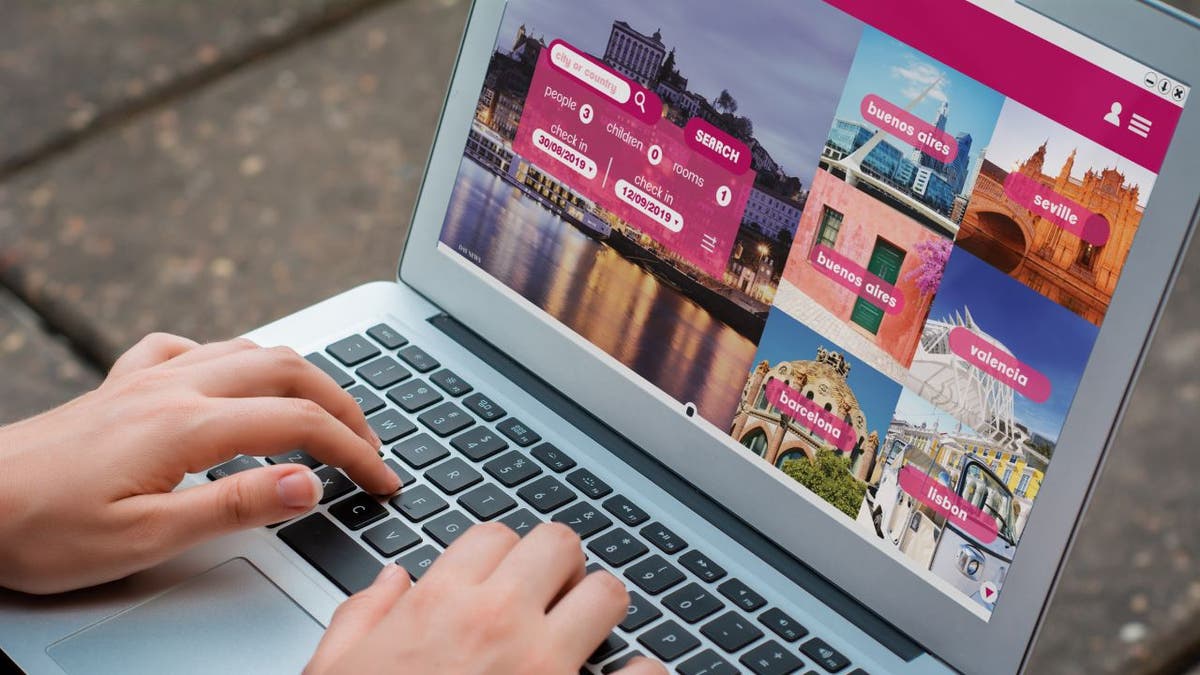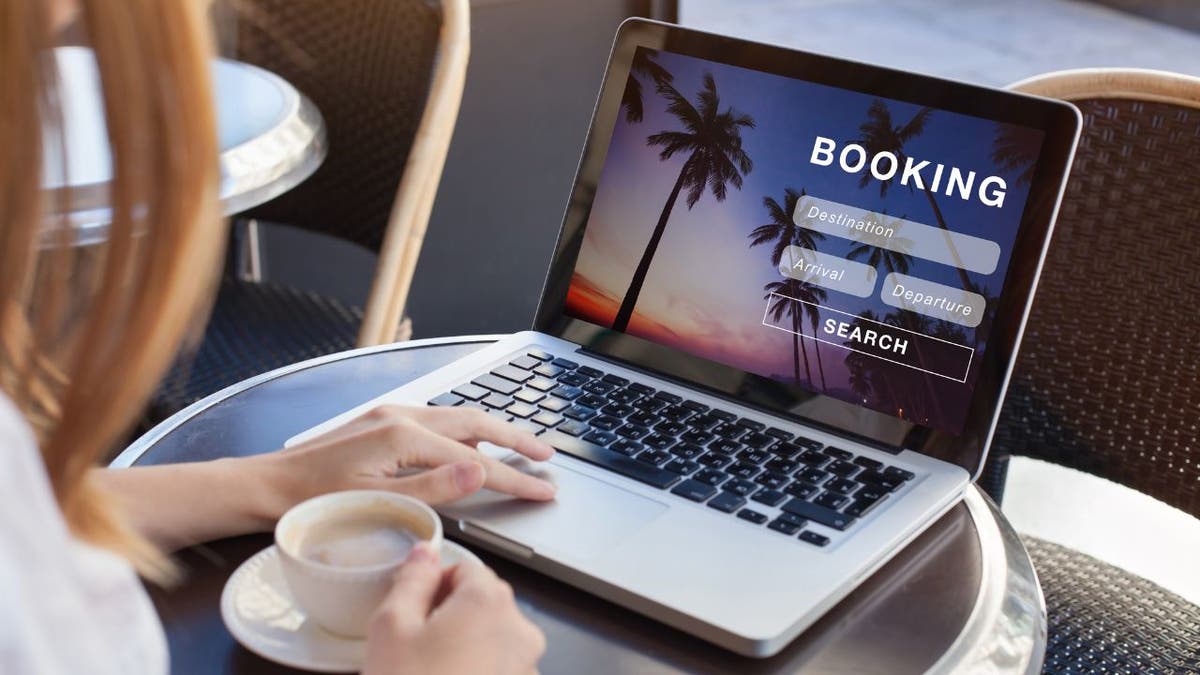
While the holiday season may be months away, now is the best time to book your travel to visit family and friends for those winter months. Typically, the further in advance you are able to firm up your travel plans, the better the deals are.
Before you start planning for your holiday travel, you should be aware that scammers are always on the lookout for unsuspecting travelers who might fall for their sneaky tricks.
Here are some tips on how to avoid common travel scams that could ruin your holiday travel plans.
CLICK TO GET KURT’S FREE CYBERGUY NEWSLETTER WITH SECURITY ALERTS, QUICK TIPS, TECH REVIEWS AND EASY HOW-TO’S TO MAKE YOU SMARTER
Plan ahead and do your research
This is why planning ahead is so important. Scammers prey on people who are trying to book last-minute trips with the best deals they can find.
Oftentimes, those who use search terms like “cheap flights,” “last-minute deals,” and “travel bargains” are the ones who end up coming across scammers first.

Man looks to book a vacation on his laptop (CyberGuy.com)
MORE: TOOLS TO RECOVER FROM A CANCELED OR DELAYED FLIGHT AT ANY AIRPORT
Verify the security of the websites you visit
Make sure you’re always using official sites that you can trust and that every site URL you’re viewing begins with HTTPS for that extra layer of security.
This is because official sites are more likely to have valid security certificates that protect your personal and financial information from hackers and scammers.
GET SECURITY ALERTS WITH THE FREE CYBERGUY NEWSLETTER – CLICK HERE
HTTPS stands for Hypertext Transfer Protocol Secure, which means that the communication between your browser and the website is encrypted and authenticated.
You can also look for a padlock icon in the address bar to verify the security of the travel websites you visit.
Seek out reliable reviews for your travel needs
One great trusted resource where you can find trusted reviews on hotels, travel agencies, and other travel-related businesses is bbb.org.
By using this site, you can also avoid falling victim to fraudulent offers or hidden fees that some unscrupulous businesses may try to lure you with.
You can check the accreditation status, complaint history, and customer feedback of any hospitality business before you make a reservation or a purchase.
MORE: HOW HACKERS COULD HIJACK YOUR TRAVEL REWARDS PROGRAMS AND DRAIN YOUR MILES
MORE: 10 WAYS TO TRAVEL LIKE A PRO FOR A WORRY-FREE TRIP
Watch out for fake listings
Scammers love tricking people by using fake holiday rental listings. They will post a listing that either doesn’t exist at all, is not up for rent, or has pictures that are not at all representative of what the rental looks like.
When looking at a holiday rental, take a close look at the cost of renting. Compare the cost with other rentals in the area to see if that cost is much lower than the other properties. That is a key sign that the listing is fake.

Man looks onto his computer (CyberGuy.com)
You should also keep your guard up if the lister is trying to get you to book the home immediately. Scammers will often try to rush you into handing over your money so that they can take it and run.
You should also see if you can find the rental property on any other sites. If you find the same rental is listed on different sites by different people or with significantly different prices, then that’s a big red flag for a scam.
MORE: ARE YOU BEING WATCHED IN YOUR NEXT VACATION RENTAL?
Don’t fall for free stuff
Scammers will also try to trick you with phishing email scams to try to convince you that you’ve won something like a free cruise or free vacation to some tropical island, even if you’ve never entered any sort of contest to win that free trip. This should certainly be a warning sign for you that you’re being scammed.
Oftentimes these “free” vacations are either fake or they have tons of hidden fees that you won’t know about until after you commit, like hidden flight and accommodation fees.
It’s just another easy way for scammers to get vulnerable people to hand over their credit card information so that they can use it for their gain.
MORE: TOP 6 REASONS WHY YOU NEED A VPN WHEN YOU TRAVEL
Hotel scams
Another sneaky trick that scammers like to use is the hotel scam trick. In this scam, the criminals will target people who are taking long journeys and will target them after they’ve been exhausted from traveling so much.
They might try to call you and pretend to be the front desk person at your hotel, offering you a room upgrade as long as you verify your credit card information.
Hotels will rarely offer you a free upgrade to your room for no reason, and if they do, it will likely happen once you’re checking in.
MORE: THE BEST TRAVEL GEAR FOR 2023

Woman looking at a booking site on her laptopp (CyberGuy.com)
MORE: BEWARE OF RISE IN SHORT-TERM VACATION RENTAL SCAMS
Use a good payment method
The most trusted payment you can use when booking something is your credit or debit card because your credit card company or bank will have a record of your transaction and will be able to trace it should something go wrong later on.
You should always avoid wiring money, paying in the form of a gift card, or other forms of payment because they are not as easily traceable.
A scammer may try to convince you to make an unorthodox form of payment, so always proceed with extreme caution or avoid it altogether if that is the case.
Kurt’s key takeaways
GET SECURITY ALERTS WITH THE FREE CYBERGUY NEWSLETTER – CLICK HERE
You must always have your guard up when booking holiday travel and make sure that you’re doing the proper research before booking anything.
A scammer will try anything to take your money, and the last thing you want is to have your fun holiday getaway ruined by a criminal.
If you use this helpful knowledge and read everything carefully, with any luck it will go smoothly with your upcoming holiday travel.
CLICK HERE TO GET THE FOX NEWS APP
What more do you think booking sites could be doing to weed out these scammers from posting fake ads? Let us know by writing us at Cyberguy.com/Contact.
For more of my tech tips & security alerts, subscribe to my free CyberGuy Report Newsletter by heading to Cyberguy.com/Newsletter.
Copyright 2023 CyberGuy.com. All rights reserved.

 Latest Breaking News Online News Portal
Latest Breaking News Online News Portal




